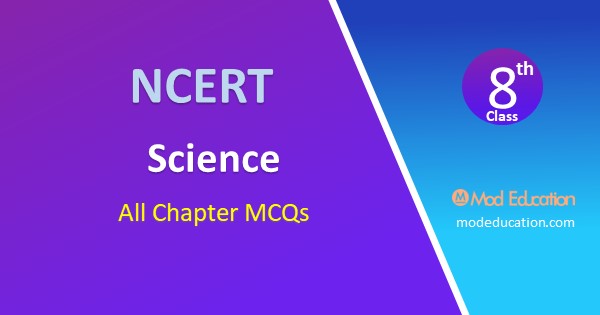MCQ Questions for Class 8 Science Chapter 10 : NCERT CBSE RBSE other Board MCQ Questions for Class 8 Science Chapter 10 Reaching the Age of Adolescence with Answers Pdf free download. MCQ Questions for Class 8 Science with Answers were prepared based on the latest exam pattern.

MCQ Questions for Class 8 Science Chapter 10 Reaching the Age of Adolescence with Answers
Question 1.
Adolescence is the period of
(a) 5 to 10 years
(b) 11 to 19 years
(c) 22 to 28 years
(d) 30 to 40 years
Answer: (b) 11 to 19 years
Question 2.
When a sperm having X-chromosome fuses with the ovum, the child born will be
(a) male
(b) female
(c) male as well as female twin
(d) it depends on the chance of fusion
Answer: (b) female
Question 3.
How many pairs of Chromosomes are found in nuclei of their cells?
(a) 22 pairs
(b) 23 pairs
(c) 24 pairs
(d) 25 pairs
Answer: (b) 23 pairs
Question 4.
Children gain height during
(a) adolescence
(b) endocrine
(c) balanced food
(d) menarche
Answer: (a) adolescence
Question 5.
Testes secrete
(a) thyroxin
(b) estrogen
(c) testosterone
(d) iodine
Answer: (c) testosterone
Question 6.
Adam’s apple is
(a) enlarged larynx
(b) mammary glands
(c) apple of adam
(d) red apple
Answer: (a) enlarged larynx
Question 7.
The chemical substances which are secreted from endocrine glands are called
(a) puberty
(b) hormones
(c) estrogen
(d) adolescence
Answer: (b) hormones
Question 8.
Out of these which one determines the sex of the baby?
(a) Hormones
(b) Chloroplast
(c) Chromosomes
(d) Pituitary gland
Answer: (c) Chromosomes
Question 9.
What is the stoppage of menstruation called?
(a) Menarche
(b) Menopause
(c) Gametes
(d) Insulin
Answer: (b) Menopause
Question 10.
Which hormone is secreted by adrenal glands?
(a) Adrenalin
(b) Insulin
(c) Testosterone
(d) Estrogen
Answer: (a) Adrenalin
Question 11.
Reproduction age in women starts when their
(a) menstruation starts
(b) breasts start developing
(c) body weight increases
(d) height increases
Answer: (a) menstruation starts
Question 12.
Which is male gonads?
(a) Hair
(b) Chest
(c) Moustache
(d) Testis
Answer: (d) Testis
Question 13.
The beginning of menstruation at puberty is called
(a) ovulation
(b) menstruation
(c) menarche
(d) menopause
Answer: (c) menarche
Question 14.
In males, the sex chromosome consists
(a) one X and one Y
(b) both X and X
(c) both Y and Y
(d) one M and one X
Answer: (a) one X and one Y
Question 15.
Production of thyroxin requires
(a) sodium
(b) magnesium
(c) iodine
(d) bromine
Answer: (c) iodine
Question 16.
The period of life, when the body undergoes changes, leading to reproductive maturity, is called
(a) childhood
(b) adolescence
(c) Grown up
(d) Old age
Answer: (b) adolescence
Question 17
The human body undergoes several changes during adolescence. These changes mark the onset of
(a) Puberty
(b) Prematurity
(c) Post adolescence
(d) ageing
Answer: (a) Puberty
Question 18.
Adam’s apple is prominent in
(a) Boys of any age
(b) Adolescent girls
(c) Girls of any age
(d) Adolescent boys
Answer: (d) Adolescent boys
Question 19.
Larynx is also called
(a) Voice box
(b) Sound box
(c) Black box
(d) All of the above
Answer: (a) Voice box
Question 20.
Acne and pimples on the face is due to secretion of
(a) bile from liver
(b) Oil glands during puberty
(c) Enzymes in the digestive tract
(d) Tear from tear glands
Answer: (b) Oil glands during puberty
Question 21.
Testosterone is a hormone found in human ___
(a) Children
(b) males and females
(c) Females only
(d) Males only
Answer: (d) Males only
Question 22.
The first menstrual flow is called
(a) Menstruation
(b) Mensuration
(c) Menarche
(d) Menopause
Answer: (c) Menarche
Question 23.
Menopause occurs at the age of
(a) 10-12 years in boys
(b) 45-50 years in men
(c) 10-12 years in girls
(d) 45-50 years in women
Answer: (d) 45-50 years in women
Question 24.
When a sperm containing Y chromosome fertilizes an egg with X chromosome, the zygote develops into a _____ child
(a) Female
(b) Either a male or female
(c) Male
(d) No child
Answer: (c) Male
Question 25.
The change from larvae to adult is called
(a) Metabolism
(b) Metamorphosis
(c) Metastasis
(d) Morphology
Answer: (b) Metamorphosis
